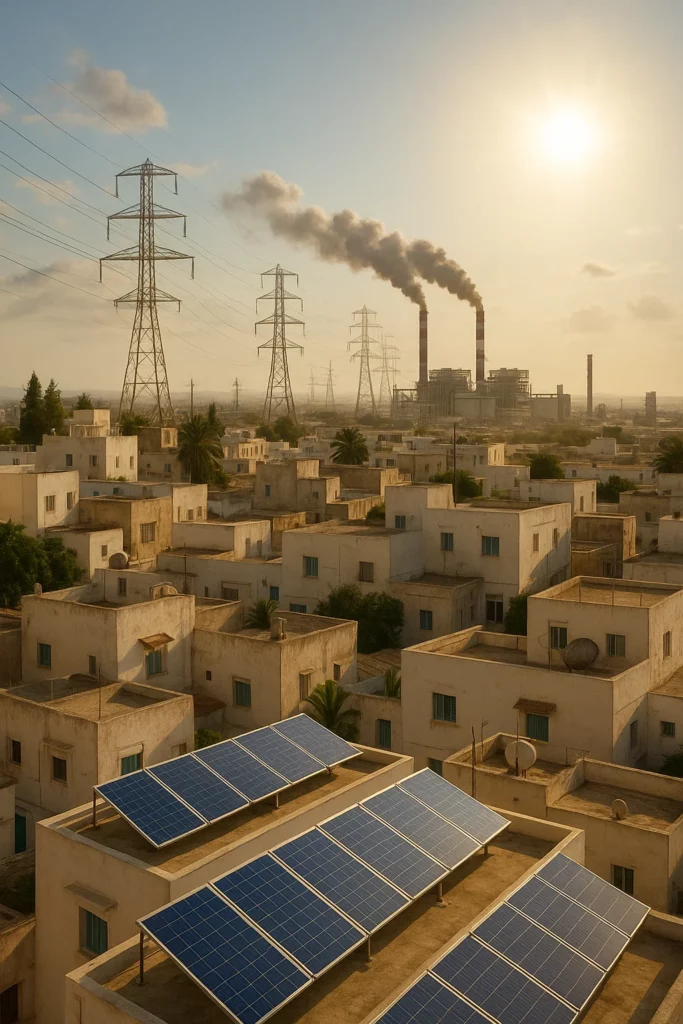🔌 An Overburdened Electrical System
For several years now, Tunisia has been facing a structural energy crisis. The demand for electricity keeps growing, driven by urbanization, the rise of digital technology, and increased air conditioning needs during the summer. Unfortunately, the production and distribution infrastructure is struggling to keep up, putting increasing pressure on the grid.
Despite the efforts of STEG (Tunisian Electricity and Gas Company), ensuring stable, equitable, and universal service remains a challenge. The current model—highly dependent on imported natural gas—exposes the country to numerous risks: economic, social, and environmental.
In this context, solar energy in Tunisia appears to be a credible and sustainable alternative. It is perfectly suited to the local climate, cost-effective in the medium term, and accessible to both individuals and businesses.
Here are the 5 main electricity-related issues in Tunisia—and how solar can provide concrete solutions.
⚡ Problem 1: Frequent Power Outages
During summer heatwaves, electricity consumption skyrockets due to air conditioners. The already fragile grid can’t cope, leading to frequent, and often unannounced, power outages. This affects both households and businesses—causing discomfort, damage to appliances, and halted production.
Photovoltaic solar energy, when combined with a battery system, ensures continuous power supply even during outages. For businesses, this means better resilience and reduced economic losses.
💸 Problem 2: High Electricity Costs
Electricity prices have increased significantly in Tunisia in recent years. The gradual removal of subsidies, the depreciation of the dinar, and the rising cost of imported gas all heavily impact bills. Households see their purchasing power erode, while companies lose competitiveness.
Installing solar panels allows users to generate their own electricity from the sun—completely free. This drastically cuts monthly electricity bills, offering a fast return on investment within a short period—making solar not just smart, but strategicIt’s a long-term economic solution, especially in a country as sunny as Tunisia.
⚙️ Problem 3: Instability and Poor Power Quality
Beyond outages, the Tunisian grid suffers from frequent voltage fluctuations—spikes, sudden drops, and general instability. These variations damage sensitive equipment: servers, household appliances, industrial or medical machines. The result is high maintenance costs and unexpected interruptions.
A photovoltaic solar system equipped with a high-quality inverter can automatically regulate voltage and stabilize the power supply. This is a major advantage for professionals who need clean and stable electricity.
🌍 Problem 4: Dependence on Imported Natural Gas
Electricity production in Tunisia is heavily reliant on natural gas, more than 50% of which is imported. This dependence makes the country highly vulnerable to global price increases, geopolitical tensions, and contributes to the trade deficit.
Solar photovoltaics enable 100% local and renewable energy production. By reducing our reliance on imports, Tunisia can regain more energy sovereignty and stabilize public spending related to energy.
📉 Problem 5: High Carbon Footprint and Export Risks
Electricity production in Tunisia emits an average of nearly 600g of CO₂ per kilowatt-hour—well above European standards. For Tunisian export-oriented companies, this is a growing disadvantage: the CBAM (Carbon Border Adjustment Mechanism) now imposes a carbon tax on products made with polluting energy.
Investing in solar allows industries to green their production chain, reduce their carbon footprint, and stay competitive in European markets. In the long run, it could even become a commercial and marketing asset.
☀️ Conclusion: Solar Power — A Structural and Sustainable Solution
Tunisia’s energy challenges are real, but solutions exist. Solar energy is no longer a luxury or an activist choice—it is an economic, ecological, and strategic necessity. It not only addresses current electricity issues but also paves the way for a sustainable energy transition.
For both businesses and individuals, investing in solar today means gaining more autonomy, greater stability, and a more sustainable future.
Gamco Energy, a pioneering force in Tunisia’s solar energy sector, is here to support you in making your energy transition a reality.
With proven technical and commercial expertise, Gamco Energy guides you from personalized assessment to the installation of photovoltaic solutions tailored to your needs—whether it’s a small residential system or a large-scale industrial project.
Contact Gamco Energy today for a free consultation, and turn the Tunisian sun into your most powerful energy ally!



